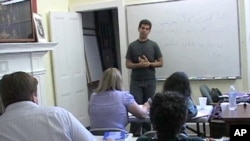Summer vacation is ending and students at American schools and colleges are getting ready to head back to class. In previous years, many of them would have been taking French or Spanish as a second language. Knowledge of Arabic or Farsi is now considered "critical" to U.S. national security and more Americans are learning these languages today than ever before.
Jason Kopp is practicing Farsi in Washington with his private tutor at the Middle East Institute, an independent research center that offers courses in such languages as Farsi, Arabic, Dari and Hebrew. Jason has been studying Farsi for less than three months but he says the grammar is easier than he expected.
The Middle East Institute says the number of students clamoring to learn Farsi or Arabic at its center has tripled over the last few years. Farinaz Firouzi coordinates classes here. She says her typical student is a young American who wants to be more attractive to the federal government.
"Maybe they first studied Arabic and now with the change in the news and the international situation, they want to change jobs and are interested in either Afghanistan or Iran," said Firouzi.
The Modern Language Association tracks trends in foreign languages on American campuses. It says the number of students enrolled in Arabic or Farsi classes was relatively low. But the rate of enrollments is now staggering. Arabic language enrollment shot up more than 125 percent between 2002 and 2006 while Farsi enrollment increased by nearly 75 percent during those years. In comparison, enrollment in all foreign languages increased by less than 13 percent during the same period.
"After 2001 we noticed demand for classes went up. We were forced to go after more instructors and add classes," Firouzi added.
Why so much interest in these two languages? A job search on the Internet provides some answers. Hundreds of new jobs in the U.S. require applicants to have some knowledge of Arabic or Farsi. Think tanks, consulting firms, the federal government and the military are looking for translators, intelligence analysts and IT specialists who have a working knowledge of either language. Jason oversees translation and language projects for the White House and the U.S. State Department.
"From a work standpoint it was a good language for me to become familiar with because I'd be becoming familiar with the Arabic alphabet and another language that we have work in more often than we used to," said Kopp.
The government labels Arabic and Farsi the new "critical languages" along with Chinese, Hindi, and a few others. In 2008, it doubled the funding of a foreign language initiative which encourages colleges and high schools -- even middle schools -- to include these languages in their curricula. The aim is to create a future American workforce that can interact with these critical languages by starting as early as kindergarten and following up through the college years.
But despite the heightened interest in both languages the need for trained instructors of Arabic and Farsi in the U.S. outweighs the supply. In 2008, the last time data were available, the total number of people in the U.S. who received a graduate degree in either Arabic or Farsi was just 13.




